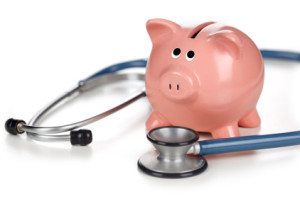Everyone’s gotta eat. Even people who undergo hunger strikes have to eat at some point (or face an alternate end to the strike). Along with shelter, transportation and cell phones, food and drink are the necessities of life. So we should naturally find the least expensive way to do it. Some people scoff at the idea of saving money on food, but finding ways to minimize your money spent on food, without sacrificing nutrition or flavor, will lead to a lifetime of money saved.
There are two main ways to get food nowadays: eat out and have someone else cook for you or cook at home with stuff bought at the grocery store. You can also make lots of friends and attend lots of dinner parties, but that sounds exhausting. Gone are the days of hunting, gathering and foraging for our food. No longer do we have to be the strongest or fastest to get the best food. We are definitely blessed to live in a period where good food and clean water are plentiful and relatively cheap. But it CAN get expensive if you’re not careful.
Eating out is almost always more expensive than making your meals at home. But eating out once in a while can be fun, so if it is a regular thing for you, try to minimize it. This will have two main benefits. One, you will definitely save money. When you eat out you not only pay for the food, but also the salaries of the people who cook it and then some so the place can turn a profit. You are almost always going to save money by staying home (unless you only eat from the dollar menu. Then you might save a little but your food will suck.) The second benefit to eating out less? It will actually make the experience more memorable. Once you do something regularly, no matter how awesome it seems at first, it will become routine and not as exciting anymore (think first week of driving a car and driving a car for years). Save it for really special occasions and it will definitely become more memorable.
Now that we’ve determined that eating at home is cheaper and better, what’s the best way to save money on groceries? Some people love coupons. Others will swear by a certain grocery store. The truth is, all these little strategies can be right because being an efficient grocery shopper requires experimenting. Find out when the best time to shop is one example. A lot of people shop after work, but a lot of people are tired after work so they might just pick the more expensive thing because they have trouble finding the cheaper one. Some people are very organized and love keeping folders of coupons. Others throw coupons right into the trash. It will take some time, but doing experiments and finding what works for you is the only way to really save money shopping for groceries.
Drum roll please…
But there is one thing that EVERYBODY can benefit from to save money on groceries. From the fabulous couponistas to the broke grad school student just stocking up for the week, all shoppers can benefit from making a shopping list. Something as simple as looking in your fridge and seeing what you need for the upcoming week or so and typing it into your phone will save you a lot of time and money at the grocery store. Making a list will guide you on which aisles you should be in, rather than just wandering from aisle to aisle in a snakelike fashion. You will get what you need and get out of there, without picking up those colorful donuts that were on sale (and are probably stale).
Another benefit of consistently making a list when going grocery shopping is that you will start noticing what staples you really need and will start finding the best places to shop for them. Some stores tend to have better prices (or quality) when it comes to produce or dairy etc. Finding those things you consistently use at the lowest prices will do wonders for your budget. So if there’s one single thing you can do to consistently save money on groceries, making a list is definitely it. And what do we do with our newfound saved money? Apply it to our debt repayment plan or increase our savings/investment. That sounds pretty appetizing.




